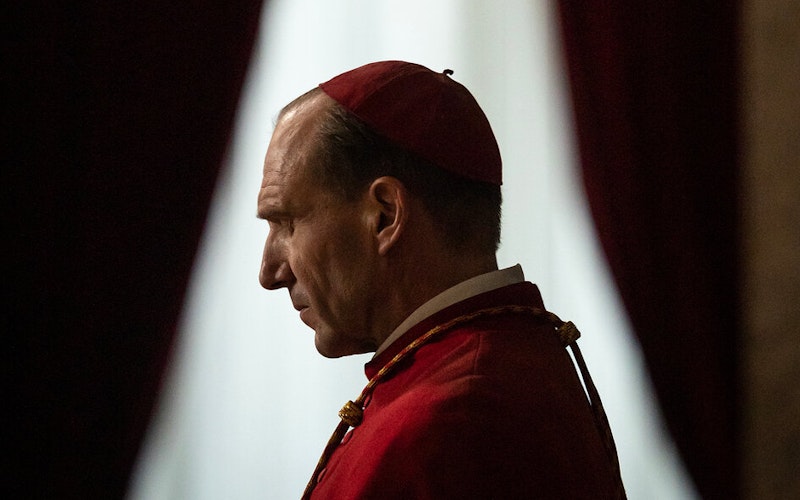
Movies
Conclave and the Sin of Certainty
A high-stakes thriller about a pivotal election whose results could affect the lives of millions, director Edward Berger’s Conclave details the intensely political process that Catholic cardinals undergo to elect a new Pope.
Conclave has a disarming relevancy in how it dissolves the tight lines that we often draw between the politics of the outside world and that of the church. In trying to secure a seat of power—whether it’s the title of Holy Father or that of President—Berger reveals how people can commit great harm when driven by the illusion of certainty. Conclave rebuffs the security that certainty seemingly provides, instead positing that it is an embrace of our doubts that will lead to greater flourishing in our political and spiritual lives.
After the unnamed Pope dies, the closing lines of a prayer have barely been uttered before the process of selecting a successor is underway. Lawrence (Ralph Fiennes), the Dean of the College of Cardinals, is tasked with overseeing the electoral process, a duty he begrudgingly fulfills. Watching his fellow cardinals, who have flown in from all over the world to participate in the election, he witnesses them greet each other with a holy kiss (or at least a firm handshake), while in the same breath plotting how to disqualify each other from the ballot. They may be a conclave of many colors, but in Lawrence's eyes, they’re all different strands of the same cloth, each driven by a desire to win the seat at all costs.
While any of the cardinals can be nominated to be Pope, there are four main frontrunners: Bellini (Stanely Tucci), a progressive cardinal who hopes to continue the work done by the late Pope; Tedesco (Sergio Castellitto), a fundamentalist who wishes to undo that legacy; Tremblay (John Lithgow), a more moderate conservative with a keen sense of political strategy; and Adeyemi (Lucian Msamati), who holds the lead until a secret from his past catches up with him.
At the start of the proceedings, Lawrence delivers an impassioned homily on the importance of doubt. “There is one sin I have come to fear above all else: certainty,” he tells his fellow cardinals. In reality, Lawrence argues, living out one’s faith genuinely is a messy thing; we often swing between states of belief and disbelief. Rather than welcome those with questions, the church sometimes ostracizes them for fear that such mindsets will spread—an act that ironically keeps people away from the very community that they may need. Lawrence ultimately urges the cardinals to embrace a faith that has room for uncertainty. “If there was only certainty and no doubt, there would be no mystery,” he suggests, “and therefore no need for faith.”
This idea of certainty is emphasized by the movie's costume design. Apart from a few embellishments to distinguish rank, the cardinals all wear the same attire; Berger further accentuates this with frequent shots showcasing how the men even seem to move as one. The same way a well-worn robe provides a sense of security and warmth, the cardinals' clothing screams of uniformity and the comfort of lived-in rhythms. It seems far easier to fall back on what is known and certain, rather than entertain the thought of doing something that might stand out.
Lawrence urges the cardinals to embrace a faith that has room for uncertainty.
Ultimately, Conclave reminds us of a truth that often gets lost amidst the church’s dogmas and doctrines: the Christian life has room for, and even welcomes, doubt. In that same homily, Lawrence emphasizes how on the cross, Jesus himself had doubts—evidenced by his cry of having felt abandoned by God. Lawrence’s words remind me of what Pope Francis shared about doubt in a 2013 interview: “If one has the answers to all the questions—that is the proof that God is not with him. . . . The great leaders of the people of God, like Moses, have always left room for doubt. You must leave room for the Lord, not for our certainties; we must be humble.”
Indeed, having doubt is a reminder that we are people bound by time and space. It’s natural to question, given our limited understanding, and it can be in this questioning that we increase our knowledge and exercise our faith. Conclave reminds us that reform is in the church’s DNA. Towards the end of the conclave, Cardinal Benitez (Carlos Diehz), a relatively new cardinal from Kabul, expresses his disappointment at the men’s pettiness and rigid adherence to the past. Instead, Benitez argues that the church should be about “what we do next.” He claims that what the world needs is not a church that doubles down on doctrine in ways that are isolating and unwelcome, but one that seeks to embody Christ in the way he expanded the scope of love and grace.
While Jesus too honored the laws of the Old Testament, he also came to widen the breadth of their influence. He expanded the Mosaic concern for the fatherless, widows, and foreigners to also include “the poor, the crippled, the lame, the blind. . .” He pushed his followers away from the demands of an eye for an eye and toward a posture of nonviolence. In many ways, his ministry was about “what we do next.” May this serve as an encouragement to us that our churches can adapt to a changing and broken world, not through doubling down on the sin of certainty, but by seeing the disrupting power of doubt as a gift.
_______________
At Think Christian, we encourage careful cultural discernment. We recognize and respect that many Christians choose not to engage with pop culture that contains particular content, such as abuse, sex, violence, alcohol or drug use, or that employs the use of coarse language. To that end, we suggest visiting Common Sense Media for detailed information regarding the content of the particular pieces of pop culture discussed in this article.
Topics: Movies